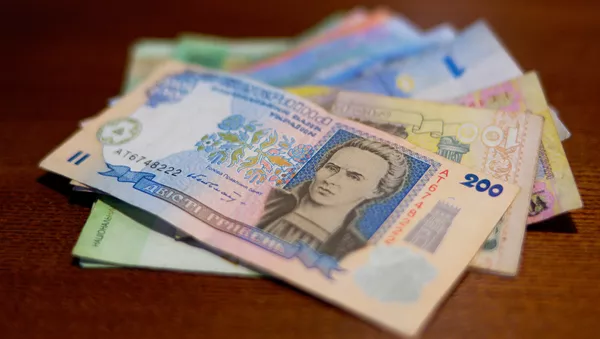MOSCOW, September 26 (RIA Novosti) - You can't mess with the laws of economics and the Ukrainian government is about to learn this basic principle the hard way. The currency crisis in Ukraine is in full swing.
Starting a civil war, wrecking the most productive and most industrialized part of your country, and starting a trade war with your biggest foreign partner is a good recipe for ruining your country's currency stability. Viktor Yanukovich managed to keep the hryvnia exchange rate at a relatively stable 8 hryvnias per dollar for nearly the duration of his administration (the hryvnia had been trading at 5 per dollar before the crisis and fell in late 2008 under Viktor Yushchenko). However, the US-supported government of Arseniy Yatseniuk can't push the rate below the level of 12 hryvnias per dollar. This level is considered critical, because according to the Prime Minister’s own calculations, a higher exchange rate will wreak havoc on the national economy.
This week, the hryvnia briefly touched the 15 UAH/USD level, prompting emerging market specialists to think that the country is rapidly approaching a default. Washington-based research outfit EmergingEquity.org tweeted:
Fall In Hryvnia Raises Questions Over Sustainability Of Ukraine's Debts http://t.co/b2CcNmSZjo @bizneweurope
— Emerging Equity (@EM_Equity) September 24, 2014
The government’s answer has been to respond in the way that many other doomed economies teetering on the brink of hyperinflation have been known to respond: with capital and currency controls. Ukraine's National Bank makes exporters sell 75% of their hard currency revenue. On top of that, there is a list of prohibitions regarding the usage of the hryvnia and foreign currency.
Foreign currency payments on imports are prohibited if the customs registration of goods takes more than 180 days. Foreign investors, i.e. the foreign banks and the offshore holding companies of Ukrainian oligarchs, are forbidden from receiving a return on their investments from selling Ukrainian securities beyond the stock exchange, except government bonds. Foreign investors are also forbidden from receiving a dividend return on Ukrainian shares that are not traded on the country's stock exchanges, basically trapping a significant amount of capital inside Ukraine.
The National Bank has also limited the amount of hard currency that can be bought by an individual to the equivalent of 3,000 hryvnias per day, which is less than 230 dollars at the current exchange rate. Also, top politicians and central bank officials have blamed “speculators” for driving the currency rate upwards. It is hard to understand who those speculators are, because there should be no speculators left in Ukraine. The country's National Bank barred the banks that were trying to buy dollars from the interbank market and even had a meeting with top banking executives in order to establish “a fair market price for the hryvnia” which is around 12.4 UAH/USD, according to National Bank officials. So far, the results are unimpressive.
London-based foreign exchange expert Katie Martin summed up the Ukrainian currency rate management in one tweet:
Ukraine's hryvnia is on the ropes. Officials vow to "punish" speculators. http://t.co/LatFPrKR85 By @kolyandr and @chiaraalbanese
— Katie Martin (@katie_martin_FX) September 23, 2014
At pixel time , the rate is 13.4 UAH/USD and is relatively stable. However, experience shows that when economic analysis gives way to “speculator witch hunts” the currency is doomed to depreciation.
According to Ukrainian president Poroshenko, as quoted by the news site Liga.net, “somebody is trying to unleash an internal war in Ukraine, undermining the stability of the state and undermining the stability of the currency exchange rate”. Having a president who believes in conspiracy theories and uses them to explain the currency rate is a bad omen for Ukraine. Usually, the speculators and conspirators are used as scapegoats by dictators from Latin America or Sub-Saharan Africa. Such situations never end well. Last month, I wrote that “on top of the currency crisis, there is an energy crisis brewing”, and yesterday Kiev experienced its first two-hour blackout. It may be that Ukraine's economy has past the point of no return.

